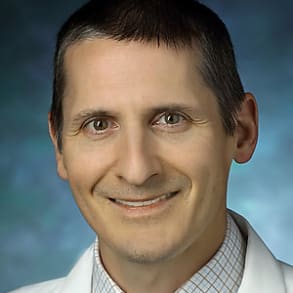Cardiologist Ari Cedars answers questions about Johns Hopkins’ Adult Congenital Heart Disease (ACHD) program and considerations in transitioning children to adult CHD care.
mhm. There is no fixed age at which transfer of care to an adult congenital heart disease providers should take place. And decision making should be individualized between the patient, their family and the pediatric cardiology provider. We're here is a resource when you have questions for age related disease processes that you may not be as comfortable treating here. Johns Hopkins. We know that you want what's best for your patients. The ways in which age related disease processes or just normal age related behaviors like pregnancy may interact with congenital heart disease may not be familiar to you as a pediatric. Cardiologists. We're here to support you along the way, advise you, and to ensure that your patients enjoy the best outcomes in the adult Congenital Heart Disease Center At Johns Hopkins, we offer a patient centered approach to care. My job is an adult congenital heart disease provider is to ensure that a patient's health is not an impediment to their achieving their goals or to them enjoying their optimal quality of life. We have a Siris of multidisciplinary clinics which allows our patients to efficiently see multiple providers that can treat all aspect of their health condition in single visits. My goal is to ensure that my patients are enjoying the best of life between their office visits. Adult congenital heart disease patients may face many challenges throughout their life anything from difficulty in finding a job that they're able to do physically insure ability or difficulties with depression or anxiety related to their heart disease. Johns Hopkins Congenital Heart Disease Program We offer psychological support through a psychologist that we have on staff as well social work support to ensure that we're supporting patients throughout all aspects of their life, mhm.



